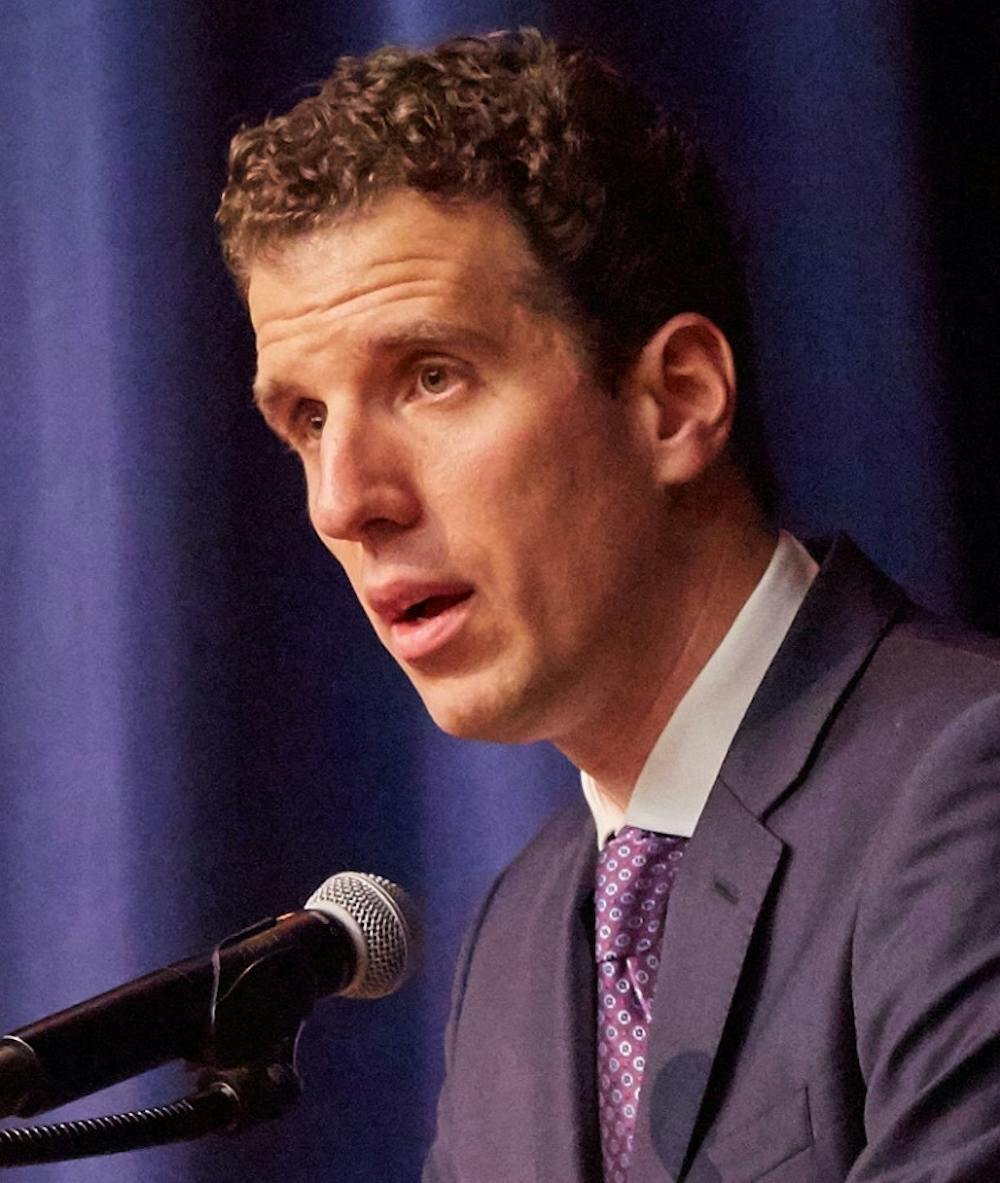Political Science Professor Keegan Callanan became a fully-tenured Political Science professor last May, but that wasn’t the only highlight of his summer.
Fifteen months after he was nominated by President Donald Trump, Callanan has joined the National Council of the Humanities (NCH), a board of 26 private citizens that advises the National Endowment for the Humanities (NEH) in its allocation of funding for a gamut of humanities programs.
Callanan was sworn in by the council’s chairman at a small ceremony in Washington D.C. four days before classes began at Middlebury. He will serve until 2024, convening with the council three times annually to discuss and vote on grant applications.
The NEH functions without input from the President, but nominations originate in the Oval Office. Callanan was among the 15 freshmen council members nominated by Trump in 2018 and confirmed by the Senate in August.
There’s no way to know for certain how his name ended up on the President’s desk, but Callanan said the White House usually casts a wide net when scouting individuals to fill these positions.
“I was recommended to Presidential Personnel by several people close to the administration,” he wrote in an email to The Campus. When asked if he knew who had recommended him, he said, “A variety of friends and acquaintances in Washington helped in the nomination and confirmation processes.”
The White House Presidential Personnel Office reached out to Callanan in early 2018 to ask for an interview, and then he was vetted — a lengthy process that included a full FBI background check and a 35-page questionnaire for the Senate Committee on Health, Education, Labor and Pensions.
Callanan’s name was then sent to the full Senate. On Aug. 2 of this year, he was confirmed.
Other new appointees include David Armand DeKeyser, a previous U.S. Senate chief of staff for Jeff Sessions and Bob Corker; Noël Valis, a Spanish professor at Yale; Kim R. Holmes, the executive vice president of the Heritage Foundation and a former assistant secretary of state; and Bowdoin Professor of Social Sciences Jean Yarbrough, who taught Callanan when he was an undergraduate at Bowdoin and also spoke at Middlebury last spring.
Members are supposed to serve six-year terms, but D.C. gridlock can prolong transitions between council members. Christopher Merrill ’79, for example, served an expired term three years past his due. Merrill, who majored in English at Middlebury and worked at the Bread Loaf Writers Conference, is the director of the International Writing Program at the University of Iowa. He was appointed to the council in 2012 by then-president Barack Obama.
Merrill attributed the delays to backlogs in the Senate confirmation process.
“In my time, the council members who were appointed under the Bush administration and then the Obama administration went through very extensive background checks, then the nominations just sat on the Senate side for a very long time,” he said. “Most of the people I was serving with were serving on expired terms, waiting for the Senate to act.”
Merrill said that in his experience, members appointed during Democratic and Republican administrations “have gotten along quite well.” Callanan said the NEH has not had a reputation for partisanship under any administration.
“This is probably because the grant-making process relies heavily, although not exclusively, on peer review,” he said. Peer reviewers read all applications before they head to the council, although council members are not required to follow reviewers’ recommendations.
According to the NEH site, the agency has issued more than $5.6 billion in funding since its inception over 50 years ago. The NEH is one of Middlebury’s major federal funding sources.
Various college faculty have benefited from the endowment’s summer stipend program, for example, which awards up to $6,000 for individual scholars to pursue summer research projects. Religion Professor Jennifer Ortegren is a recent beneficiary. She is slated to begin research on her project, entitled “New Neighbors, New Muslims: Gender, Class, and Community in Contemporary India,” next summer.
The NEH also funds institutional grants for projects involving more than one faculty member. In 2015, 2017 and 2018, Jason Mittell and Christian Keathley of the Film and Media Culture department ran summer workshops with NEH grants. Research for the sophomore seminar on “the good life” was also funded by the NEH.
To avoid conflicts of interest, Callanan has recused himself from all grants connected to Middlebury and Princeton University, where he completed a fellowship in 2017–2018.
The NCH also selects winners for the Jefferson Lecture in the Humanities and manages the nomination process for winners of the National Humanities Medal. Trump, however, has not yet awarded any National Humanities Medals during his presidency. By contrast, the medal has been awarded every year since its inception until 2016.
“It’s always been a wonderful thing, Trump’s just done away with it,” Merrill said. “It’s clear his interest in the arts and the humanities is nil.”
In March, Trump proposed severe cuts to the NEH’s budget for the third year in a row. Congress has previously rejected Trump’s suggested cuts, and is yet to approve next year’s proposed budget.
NCH meetings take place in December, March and July, with occasional teleconferences occurring throughout the year. The majority of these meetings fall during breaks in the college’s academic calendar.
Keegan Callanan joins National Council on the Humanities

COURTESY PHOTO
Callanan was sworn into the council at a small ceremony in Washington D.C. four days before classes began.
Callanan was sworn into the council at a small ceremony in Washington D.C. four days before classes began.
Comments



